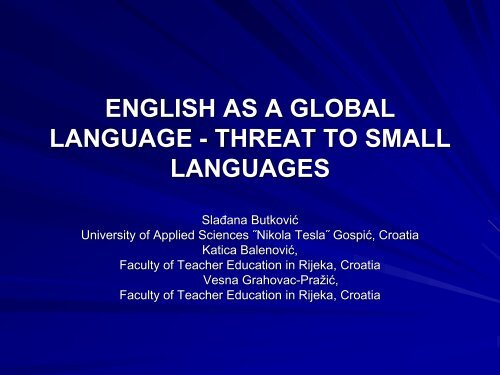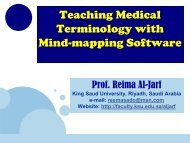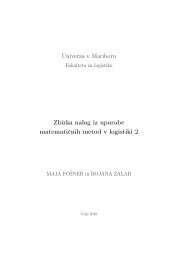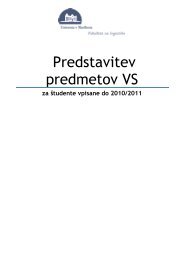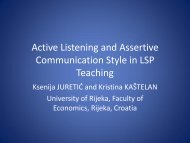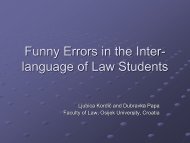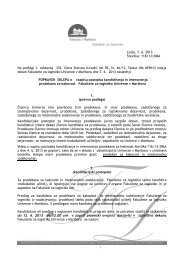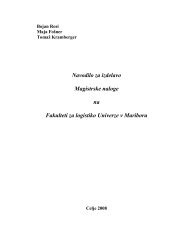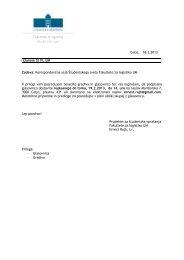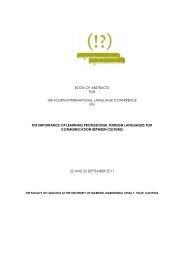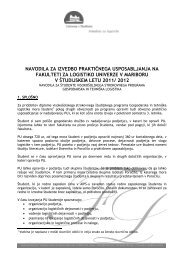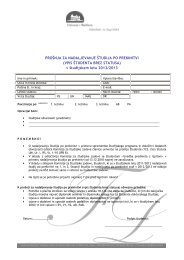ENGLISH AS A GLOBAL LANGUAGE - THREAT TO SMALL ...
ENGLISH AS A GLOBAL LANGUAGE - THREAT TO SMALL ...
ENGLISH AS A GLOBAL LANGUAGE - THREAT TO SMALL ...
You also want an ePaper? Increase the reach of your titles
YUMPU automatically turns print PDFs into web optimized ePapers that Google loves.
<strong>ENGLISH</strong> <strong>AS</strong> A <strong>GLOBAL</strong><br />
<strong>LANGUAGE</strong> - <strong>THREAT</strong> <strong>TO</strong> <strong>SMALL</strong><br />
<strong>LANGUAGE</strong>S<br />
Slađana Butković<br />
University of Applied Sciences ˝Nikola Tesla˝ Gospić, Croatia<br />
Katica Balenović,<br />
Faculty of Teacher Education in Rijeka, Croatia<br />
Vesna Grahovac-Pražić,<br />
Faculty of Teacher Education in Rijeka, Croatia
<strong>ENGLISH</strong> <strong>AS</strong> A <strong>GLOBAL</strong> <strong>LANGUAGE</strong> -<br />
<strong>THREAT</strong> <strong>TO</strong> <strong>SMALL</strong> <strong>LANGUAGE</strong>S<br />
English becomes a global language of<br />
communication<br />
perception of English - a language of cultural<br />
prestige<br />
the promotion of monolingualism and<br />
monolingual mentality is set in favour of English!<br />
Monolingualism in favour of English - regarded<br />
as a guarantee,a necessary precondition to<br />
modernity and progress<br />
multilingualism - associated with<br />
underdevelopment and economic, social and<br />
political backwardness
CROATIAN <strong>LANGUAGE</strong> AND<br />
<strong>GLOBAL</strong>ISATION<br />
What about the fate of the national<br />
languages<br />
Globalisation = the neutralisation of<br />
individual differences<br />
Today, we observe unselective assuming<br />
and influence of English
CROATIAN <strong>LANGUAGE</strong> AND<br />
<strong>GLOBAL</strong>ISATION<br />
On Croatian television:<br />
we watch soap operas,<br />
TV hosts report from the green room,<br />
and we watch the performers on stage.<br />
avoiding the use of adjectives is common<br />
noun + noun structure has become<br />
dominant in use (Motovun film festival,<br />
Zagreb Dox .....)
THE FUTURE OF <strong>ENGLISH</strong> <strong>AS</strong> A<br />
<strong>GLOBAL</strong> <strong>LANGUAGE</strong><br />
Is there another language that could jeopardise<br />
the status of the English language today<br />
alternative in another global language<br />
alternative methods of communication (an<br />
automatic translation by computer)<br />
the Chinese language<br />
the increasing promotion of national, linguistic<br />
and cultural identity of other states and nations<br />
English as the European lingua franca = a<br />
means of creating a new identity and a common<br />
mechanism
NEED FOR LEARNING <strong>ENGLISH</strong> IN THE<br />
CONTEXT OF SOCIETY <strong>GLOBAL</strong>ISATION<br />
Atkinson’s need for achievement = achieving<br />
success and motivation, avoiding failure<br />
Brindley’s two types of needs:<br />
- objective = problems of learning, level of knowledge<br />
of the laguage<br />
- subjective = related to affective needs, desires,<br />
expectations, learning style<br />
needs analysis would help in defining the<br />
objectives of a foreign language learning<br />
program
NEED FOR LEARNING <strong>ENGLISH</strong> IN THE<br />
CONTEXT OF SOCIETY <strong>GLOBAL</strong>ISATION<br />
Possible approach to the needs analysis:<br />
John Munby’s model - Communicative Needs<br />
Processor<br />
Nunan differentiates between two types of<br />
needs analysis:<br />
- learner analysis (motivation for LL)<br />
- task analysis (reasons for LL)<br />
Hutchinson-Waters model of needs analysis<br />
- focused on students’ capabilities
RESEARCH AND THE NEEDS ANALYSIS<br />
OF ADULT <strong>ENGLISH</strong> COURSE<br />
STUDENTS<br />
Hypothesis: Adult students choose to<br />
study for pragmatic reasons, i.e. adult<br />
students attend an English course for<br />
practical reasons, where globalisation<br />
processes play an important role in<br />
determining reasons for attending the<br />
course.
RESEARCH AND THE NEEDS ANALYSIS OF<br />
ADULT <strong>ENGLISH</strong> COURSE STUDENTS
RESEARCH AND THE NEEDS ANALYSIS<br />
OF ADULT <strong>ENGLISH</strong> COURSE<br />
STUDENTS<br />
The aim of the analysis was to determine<br />
specific needs for learning English<br />
RESULTS:<br />
People learn English because of professional<br />
needs (group 2)<br />
For practical needs (group 3)<br />
For love of language and Anglo-Saxon culture /<br />
affective-cultural motivation (group 1)
"Languages are not natural forces, but<br />
conventions that people use in their<br />
mutual understanding. People themselves<br />
can decide how to communicate and if<br />
they want to communicate at all."<br />
(Matasović, 2005)


